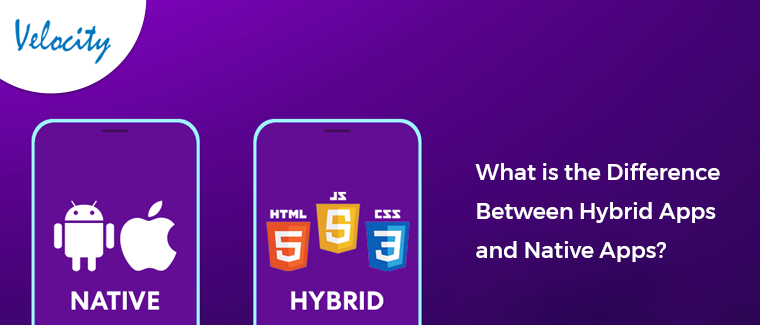If you’re a business, staying up-to-date on the latest app development trends is essential. In recent years, hybrid apps have been gaining traction over native apps. But why is that? And what are the advantages of using a hybrid rather than a native app? In this blog, we will discuss the pros and cons of both types of apps and explain why hybrid apps are becoming more popular.
Native apps are developed specifically for a specific platform, such as iOS or Android. They are written in the language native to that platform and can take full advantage of all the features and capabilities of that platform. On the other hand, Hybrid apps are built with web technologies (HTML, JavaScript, and CSS) and then wrapped in native apps. This enables them to be installed and run on a device in the same way that native apps are.
The main benefit of using a hybrid app is that you can develop it once and deploy it on multiple platforms. This saves time and money compared to developing separate native apps for each platform. Another advantage of hybrid apps is that they are typically faster and more responsive than native apps. This is because they use web technologies, which are inherently faster than traditional mobile development frameworks. Additionally, hybrid apps are easier to develop and maintain than native apps.
Although there are several advantages to using a hybrid app, there are also some drawbacks. One disadvantage is that they often don’t look or feel as polished as native apps. They might also be unable to fully utilize all of a platform’s features and capabilities.
What is the Difference Between Hybrid Apps and Native Apps?
The main difference between native & hybrid apps is that Web technologies (HTML, CSS, and JavaScript) are used to create hybrid apps before they are placed inside a native container. As a result, they may be set up and used on a device just like native apps. Native apps are developed specifically for a specific platform, such as iOS or Android. They are written in the language native to that platform and can take full advantage of all the features and capabilities of that platform.
The main benefit of using a hybrid app is that you can develop it once and deploy it on multiple platforms. This saves time and money compared to developing separate native apps for each platform. Another advantage of hybrid apps is that they are typically faster and more responsive than native apps. This is because they use web technologies, which are inherently faster than traditional mobile development frameworks. Additionally, hybrid apps are often easier to develop and maintain than native apps.
There are some disadvantages to using a hybrid app, as well. One drawback is that they often don’t look or feel as polished as native apps.
When deciding whether to develop a hybrid or a native app, weighing the pros and cons of each option is essential. If you’re looking for an app that is less expensive, faster, and easier to maintain, then a hybrid app might be the right choice for you. However, if you’re looking for an app that looks and feels more polished, a native app might be a better choice.
What Are the Benefits of Hybrid Apps?
There are many benefits to developing a hybrid app, including the following:
1. They are typically less expensive to develop than native apps.
2. They often have shorter development timelines than native apps.
3. They are typically more responsive and faster than native apps.
4. They are typically easier to develop and maintain than native apps.
5. They can be developed for multiple platforms instead of just one.
6. They often have access to more features and capabilities than native apps.
7. They can look and feel just as polished as native apps.
What Are the Disadvantages of Hybrid Apps?
There are some disadvantages to developing a hybrid app, including:
1. They often don’t look or feel as polished as native apps.
2. They might be unable to take full advantage of a particular platform’s features and capabilities.
3. They may require more upkeep and maintenance than native apps.
Why Might a Hybrid App Be a Better Choice Than a Native App?
Several reasons why a hybrid app might be a better choice than a native app. One reason is that hybrid apps are typically less expensive to develop than native apps. This is because you can set up one app that will work on multiple platforms instead of creating separate apps for each forum. Additionally, hybrid apps often have shorter development timelines than native apps. This is because they use web technologies, which are inherently faster than traditional mobile development frameworks.
Another reason to choose a hybrid app over a native app is that hybrid apps are typically more responsive and faster than native apps. This is because they use web technologies, which are inherently faster than traditional mobile development frameworks. Additionally, hybrid apps are typically easier to develop and maintain than native apps.
If you’re looking for an app that is less expensive, faster, and easier to maintain, then a hybrid app might be the right choice for you. However, if you’re looking for an app that looks and feels more polished, a native app might be a better choice.
Final Thoughts
If you’re looking for an app that is less expensive, faster, and easier to maintain, then a hybrid app might be the right choice for you. However, if you’re looking for an app that looks and feels more polished, a native app might be a better choice. Before choosing a course of action, it is crucial to assess the benefits and drawbacks of each alternative. The ideal choice ultimately depends on your unique demands and objectives.










